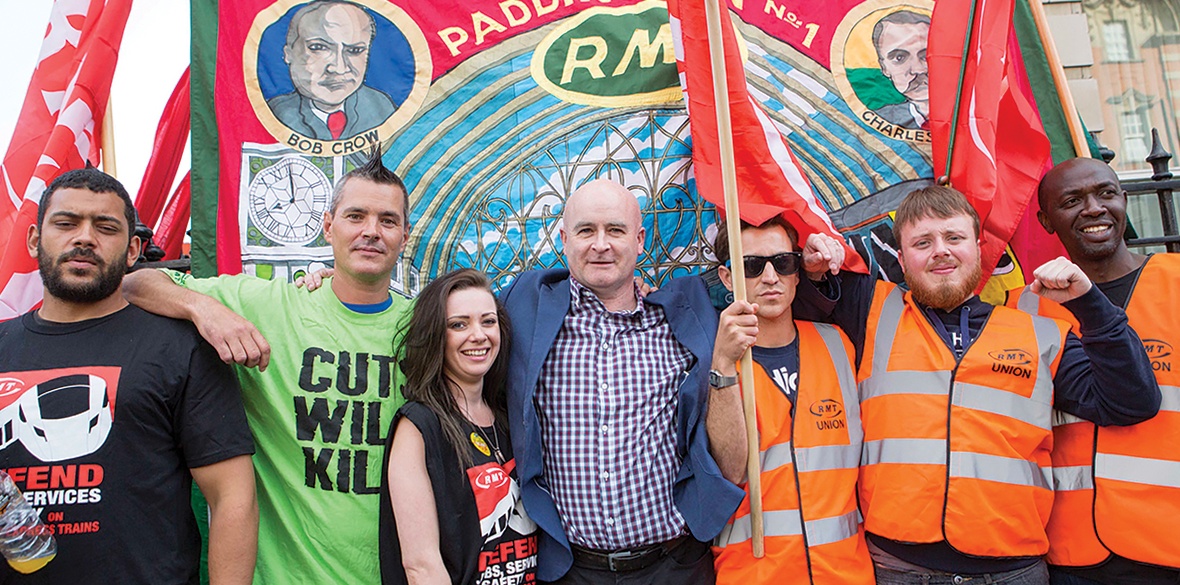This is the last article you can read this month
You can read more article this month
You can read more articles this month
Sorry your limit is up for this month
Reset on:
Please help support the Morning Star by subscribing here
THIS weekend RMT young members from across Britain are gathering in Hastings for our union’s annual young members’ conference.
Hastings is a fitting venue for a meeting of trade unionists. It was of course, the model for the town of “Mugsborough” in Robert Tressell’s classic socialist novel, The Ragged Trousered Philanthropists.
As our young trade union members gather to debate the issues most important to them, it is a salutary reminder that those who have the most at stake in the current trade union battles over the Tory cost-of-greed crisis are young people.
From the first waves of “fire and rehire” in the wake of the pandemic, it was often young workers who bore the brunt of sackings and re-employment on inferior conditions.
In the current strikes over wages and collectively bargained contracts of employment, it is young workers who have the most to lose in future earnings and working conditions if the employers’ attacks are allowed to succeed.
And from next month’s Budget on the Ides of March, it is young people and children who will be particularly hit by the public spending cuts that a Tory Chancellor will announce.
As well as epic social events where great and lasting friendships are made, trade union youth conferences are a sign of the increasing role played by young workers in today’s trade union movement.
This has not always been the case, however. We should also be teaching young trade unionists that they stand in a formidable tradition of young workers who stepped forward at crucial moments in our history to organise their class and to fight back against exploitation and discrimination.
When I joined the National Union of Railwaymen in 1989 aged 23, both the rail industry and the union that I had joined, seemed like a place for old men.
Cuts to the rail network in the 1960s and ’70s had bequeathed a “stop-start” approach to recruitment in the railways.
By the 1980s, my generation had become guinea pigs in a fresh railway recruitment drive.
Maggie Thatcher’s Tory government, on a mission to smash trade unions and cut workers’ wages, pursued policies of deindustrialisation that created three million unemployed.
She saw mass unemployment as a way to supply cheap labour to employers, partly through her “Youth Training Scheme.”
British Rail played its part in this. By 1988 the Railway Training Scheme paid “youth railway trainees” as little as £29.50 a week for a variety of menial but essential tasks, such as cleaning out old storerooms, signal boxes and railway offices.
Many of these RTS trainees went on to win promotion to full-time railway jobs and enjoyed successful, life-long careers in railway signalling, train operations and engineering.
Many of them became trade union activists in RMT and other rail unions and continue to be reps, branch and even full-time officials in our union today.
What these young workers had on their side — besides the energy and optimism of youth — was a trade union with strong collective bargaining arrangements for entry grades across the rail industry.
The NUR gave exploited young workers in the railways a powerful national voice.
In 1987, NUR’s annual general meeting backed a call from the union’s Blackpool & District Branch for YTS recruits to be part of collective bargaining negotiations.
The following year NUR’s annual general meeting carried a resolution from its Glasgow No 6 and Brighton branches demanding full employee status for YTS trainees and union pay rates.
Five years later, Thatcher’s successor, John Major, began privatising Britain’s railways. Private rail companies, high on government subsidies and corporate ideology, believed young workers could be brainwashed to accept inferior pay and conditions. How wrong they were.
Instead of a generation of lambs to the slaughter, Britain’s bosses created a brand new awkward squad.
In 2002 RMT elected 40-year-old Bob Crow, as our youngest-ever general secretary — a generational shift and a shift of attitude, strategy and tactics.
As private shareholders enriched themselves at public expense, RMT members fought back and young workers flocked to our union in their tens of thousands.
Fast forward to today. Rishi Sunak’s Tories are repackaging rail privatisation for a new era of job, pension and pay cuts, while the prices we pay for food, energy, housing and transport rocket.
Capitalism is an unequal society, becoming more unequal by the day.
Young workers are being mugged to pay for Tory corruption and capitalist failure. Pay freezes, job and pension cuts fall hardest on young workers who lose most from attacks on future earnings.
Today’s transport industries are full of young workers, from engineering to operations to customer services and a new generation has already stepped forward to lead our fightback.
A young RMT member, Bella Fashola of our Hastings Branch played a leading role winning a 100 per cent Yes vote for strike action by outsourced railway cleaners last year in RMT’s campaign for £15 an hour, free travel and contractual sick pay. She was rightly recognised by winning the TUC’s 2022 organising award.
Yet millions of young workers in Britain today are not members of any union. We have to enrol them as trade union activists in this fight of their generation.
The entire trade union movement must assist young workers to join the fight of their generation for decent work, better wages and conditions and for workers’ rights to organise, bargain and strike collectively. This is the fight of our lives.
A young worker’s place is in their union.
Alex Gordon is RMT national president.










